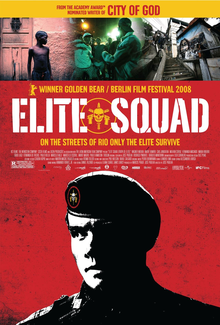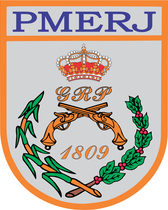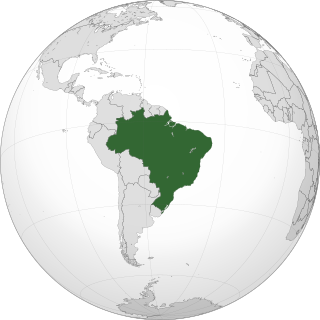
Rio de Janeiro, or simply Rio, is the capital of the state of Rio de Janeiro. It is the second-most-populous city in Brazil and the sixth-most-populous city in the Americas.

Favela is an umbrella name for several types of impoverished neighborhoods in Brazil. The term, which means slum or ghetto, was first used in the Slum of Providência in the center of Rio de Janeiro in the late 19th century, which was built by soldiers who had lived under the favela trees in Bahia and had nowhere to live following the Canudos War. Some of the last settlements were called bairros africanos. Over the years, many former enslaved Africans moved in. Even before the first favela came into being, poor citizens were pushed away from the city and forced to live in the far suburbs.

City of God is a 2002 Brazilian epic crime film directed by Fernando Meirelles and Kátia Lund. Bráulio Mantovani's script is adapted from the 1997 novel written by Paulo Lins, but the plot is also loosely based on real events. It depicts the growth of organized crime in the Cidade de Deus suburb of Rio de Janeiro, between the end of the 1960s and the beginning of the 1980s, with the film's closure depicting the war between the drug dealer Li'l Zé and vigilante-turned-criminal Knockout Ned. The tagline is "If you run, the beast catches you; if you stay, the beast eats you."

Cesar Epitácio Maia is a Brazilian politician, notable for having been elected three times for mayor of Rio de Janeiro.

Jacarezinho is a favela in Rio de Janeiro, with more than 60,300 residents living in an area of 40 hectares. It is located in the North Zone of the city, and borders the neighborhoods of Jacaré, Méier, Engenho Novo and Triagem. It is the third-largest favela in Rio de Janeiro, behind Rocinha and Complexo do Alemão. The favela expanded as the city industrialized, and it became the biggest favela in Rio de Janeiro by the mid-20th century, with a population of 23,000 in 1960. The crucial element in its growth was the industrial boom in the nearby Méier district after World War II, according to the historian Julio Cesar Pino, author of a book about the favelas of Rio de Janeiro.
The term City of God may refer to The City of God, a fifth-century book by St. Augustine of Hippo, and subsequently to the Roman Catholic Church and its unity with civil power, such as existed between it and the Holy Roman Empire in the Middle Ages.
Brazilian hip hop is a national music genre in Brazil. From its earliest days in the African-Brazilian communities of São Paulo and Rio de Janeiro, the genre has grown into a countrywide phenomena. Rappers, DJs, break dancers and graffiti artists are active across the complete spectrum of society blending Brazil's cultural heritage with American hip hop to form a contemporary musical fusion.
Kátia Lund is a Brazilian film director and screenwriter. Her most notable work was as co-director of the film City of God.
Funk carioca, also known as favela funk, in other parts of the world as baile funk and Brazilian funk, or even simply funk, is a Brazilian hip hop-influenced music genre from Rio de Janeiro, taking influences from musical styles such as Miami bass and freestyle.
Comando Vermelho, also known as CV, is a Brazilian criminal organization engaged primarily in drug trafficking, arms trafficking, protection racketeering, kidnapping-for-ransom, hijacking of armored trucks, loansharking, irregular warfare, narco-terrorism, and turf wars against rival criminal organizations, such as Primeiro Comando da Capital and Terceiro Comando Puro. The gang formed in the early 1970s out of a prison alliance between common criminals and leftist guerrillas who were imprisoned together at Cândido Mendes, a maximum-security prison on the island of Ilha Grande. The prisoners formed the alliance to protect themselves from prison violence and guard-inflicted brutality; as the group coalesced, the common criminals were infused with leftist social justice ideals by the guerrillas. In 1979, prison officials labeled the alliance "Comando Vermelho", a name which the prisoners eventually co-opted as their own. In the 1980s, the gang expanded beyond Ilha Grande into other prisons and the favelas of Rio de Janeiro, and became involved in the rapidly growing cocaine industry. Meanwhile, Brazil's shift towards democracy and the eventual end of the military dictatorship in 1985 allowed the leftist guerrillas to re-enter society; thus, the CV largely abandoned its left-wing ideology.

Elite Squad is a 2007 Brazilian crime film based on the novel Elite da Tropa by Luiz Eduardo Soares, André Batista, and Rodrigo Pimentel. Directed by José Padilha, the film stars Wagner Moura, Caio Junqueira, and André Ramiro, and tells the story of Roberto Nascimento (Moura), a captain with the Batalhão de Operações Policiais Especiais, or BOPE, who leads a police crackdown on a series of Rio de Janeiro favelas in-preparation for the Brazilian state visit of Pope John Paul II.

Brazil has one of the highest crime rates in the world, which involves an elevated incidence of violent and non-violent crimes. According to the United Nations Office on Drugs and Crime (UNODC), Brazil had a homicide rate of 21.26 per 100,000 inhabitants in 2021, up from 20.89 per 100,000 inhabitants with 43,073 murders in 2019; however, this was lower than in 2017, when Brazil had a homicide rate of 30.59 per 100,000 inhabitants. In 2018, Brazil had one of the highest number of intentional homicides in the world with 57,358. In addition, Brazil rates second in illegal drug trade in the world.
Afro-Brazilian literature has existed in Brazil since the mid-19th century with the publication of Maria Firmina dos Reis's novel Ursula in 1859. Other writers from the late 19th century and early 20th century include Machado de Assis, Cruz e Sousa and Lima Barreto. Yet, Afro-Brazilian literature as a genre that recognized the ethnic and cultural origins of the writer did not gain national prominence in Brazil until the 1970s with the revival of Black Consciousness politics known as the Movimento Negro.

The Cidade de Deus is a West Zone neighborhood of the city of Rio de Janeiro. It is also known as CDD among its inhabitants.

The Military Police of Rio de Janeiro State (PMERJ) like other military polices in Brazil is a reserve and ancillary force of the Brazilian Army, and part of the System of Public Security and Brazilian Social Protection. Its members are called "state military" personnel.

City of God is a 1997 semi-autobiographical novel by Paulo Lins, about three young men and their lives in Cidade de Deus, a favela in Western Rio de Janeiro where Lins grew up. It is the only novel by Lins that has been published. It took Lins 8 years to complete the book. The novel was hailed by critics as one of the greatest works of contemporary Brazilian literature.

Marielle Franco was a Brazilian politician, sociologist, feminist, socialist and human rights activist. Franco served as a city councillor of the Municipal Chamber of Rio de Janeiro for the Socialism and Liberty Party (PSOL) from January 2017 until her assassination.

Squatting in Brazil is the occupation of unused or derelict buildings or land without the permission of the owner. After attempting to eradicate slums in the 1960s and 1970s, local governments transitioned to a policy of toleration. Cities such as Recife, Rio de Janeiro and São Paulo have large informal settlements known as favelas. A more recent phenomenon is the occupation of buildings in city centres by organised groups. In rural areas across the country, the Landless Workers' Movement (MST) arranges large land occupations.

The armed conflict for control of the favelas in Greater Rio de Janeiro or simply Civil conflict for control of the favelas is an ongoing conflict between Brazilian militias, organized criminal groups Comando Vermelho, Amigos dos Amigos, Terceiro Comando Puro and the Brazilian state.












